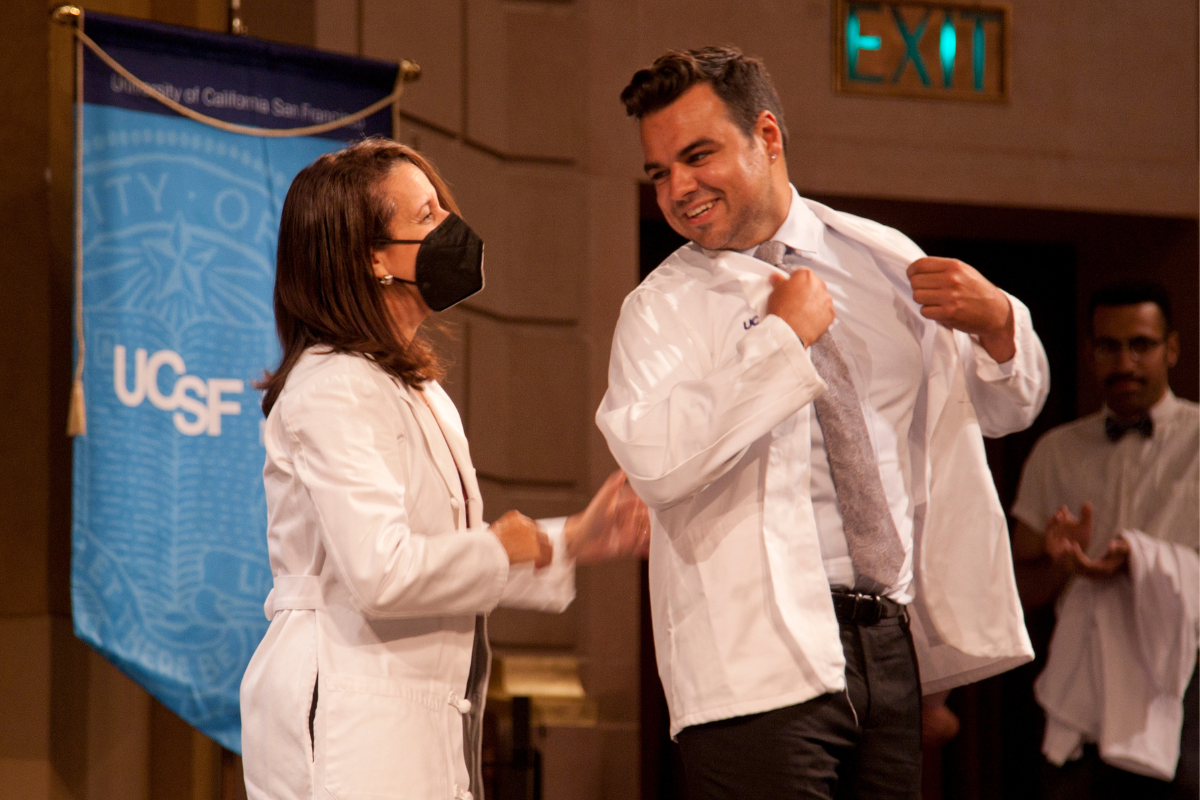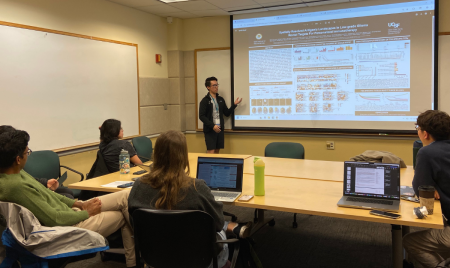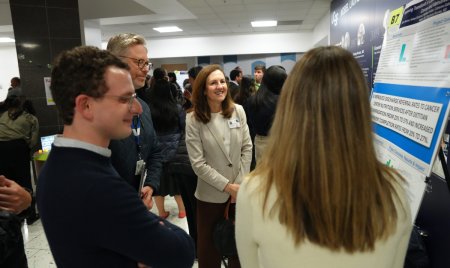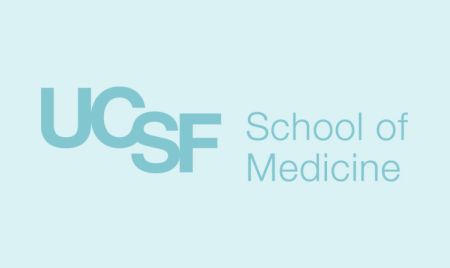"You Belong Anywhere You Want"
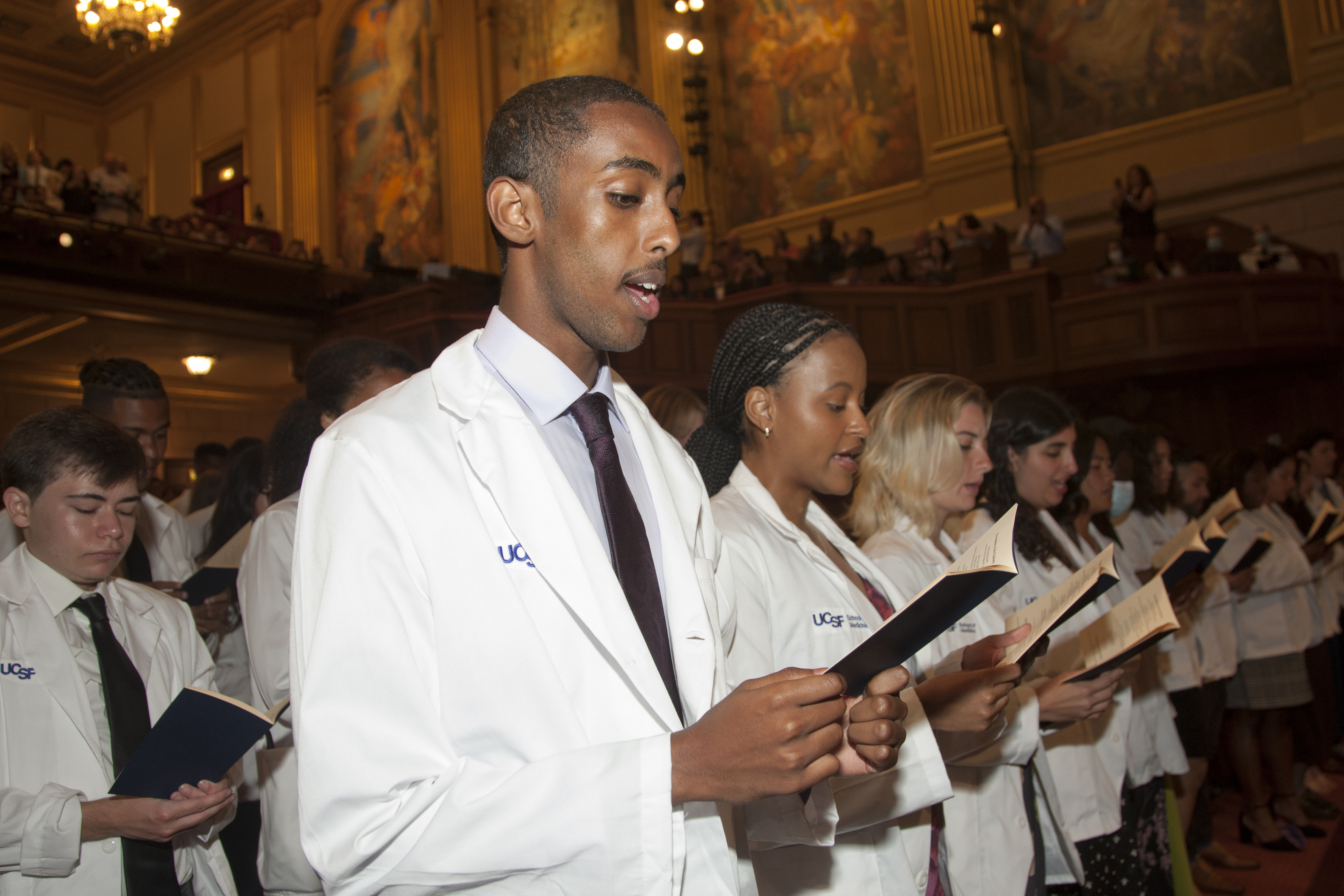
The marble lobby of Herbst Theatre in San Francisco was awash in excited whispers, a sea of smiles, and the soft clap of high fives between new classmates. Filing into the auditorium, the UCSF School of Medicine Class of 2027 marked the first steps of their medical journey with the annual tradition known as the White Coat Ceremony.
The MD Class of 2027 matriculating on the UCSF campus includes 157 students from a broad range of backgrounds. Supporting UCSF’s mission of providing the Golden State’s next-generation of physician and science leaders, seventy-one percent of the class are from California. Twenty-three percent of the incoming class are considered “first-generation” to complete college. In addition, 16 students enrolled in the UCSF-UC Berkeley Joint Medical Program (JMP) and will spend their first two and a half years at UC Berkeley. This year’s application process was highly competitive, with 8,774 applicants.
In his address to the class, Thomas J. Nuckton, MD, Vice President of the UCSF Medical Alumni Association, said, “The white coat you are receiving today is our gift to you, as a welcome to the profession and to congratulate you for demonstrating your first superb clinical judgment: choosing UCSF to begin your medical training.”
A rite of passage for all first-year students, the White Coat Ceremony signifies the beginning of medical school and a lifelong dedication to service, learning, and skill. This year, the ceremony highlighted the role of community in shaping the practice and future of medicine.
“It is an honor to have each one of you join the UCSF community,” said Talmadge E. King Jr., MD, Dean of the UCSF School of Medicine. “People are UCSF’s greatest asset and source of learning.”

For Tou Bee Thao, an incoming student in the San Joaquin Valley (SJV) PRIME Program, it is this community learning that energizes him for medical school. “I am most excited about growing and learning from my colleagues and professors, so I can develop medical skills and become a well-equipped physician in the near future,” said Thao.
Community serves as a strong motivation for Thao, a Fresno native and Hmong-American refugee. His father, Thao said, was one of Fresno Community Regional Hospital’s first Hmong health care workers. His mother was a practitioner of traditional Hmong healing therapies. Throughout his childhood, watching his parents advocate for their patients inspired him to follow in their footsteps.
“I saw [the] potential of using my lived experience... as a Hmong-American refugee to help bridge cultural, social, and socioeconomic gaps between minority communities and health care systems,” he said.
Thao also aims to give back to his community, adding, “As a Fresno native, it is my plan to practice as a physician in my hometown and serve the unique communities of Fresno.”
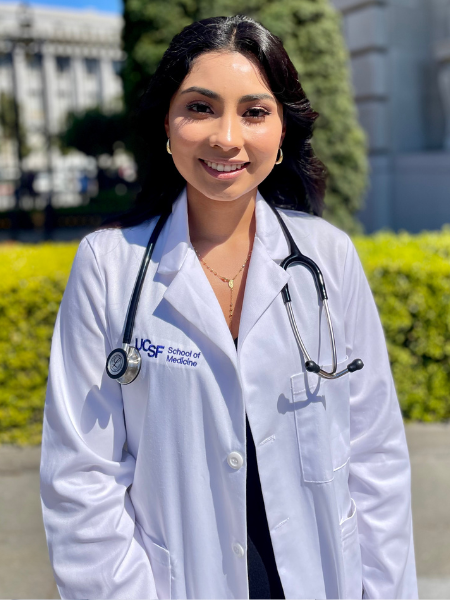
Dedication to community also drives María Gonzalez, a first-generation student from Oakland who will be joining the PRIME-US program. The daughter of undocumented Mexican immigrants, Gonzalez observed first-hand how lack of access to preventative care continued to fail marginalized communities. It was her uncle’s late diagnosis of lymphoma in a county public hospital that highlighted these inequities, leading her to pursue a medical career.
“Witnessing my community’s distrust for providers influenced my goals and passion for addressing health disparities and advocating for marginalized communities,” said Gonzalez.
Through the PRIME-US program, Gonzalez aims to give back “to the communities who need it.” “As a PRIME-US student, I will be able to employ my bilingualism and practice cultural humility as I work with underserved communities through community-based projects. Working directly with patients who remind me of my own community members helps me feel fulfilled,” she said.
Korena Boyd, an incoming student in the MD program, is also committed to transforming and giving back to members of her community. In her journey to medicine, Boyd “was driven by a sense of duty to ensure that no individual was denied their right to health care.”
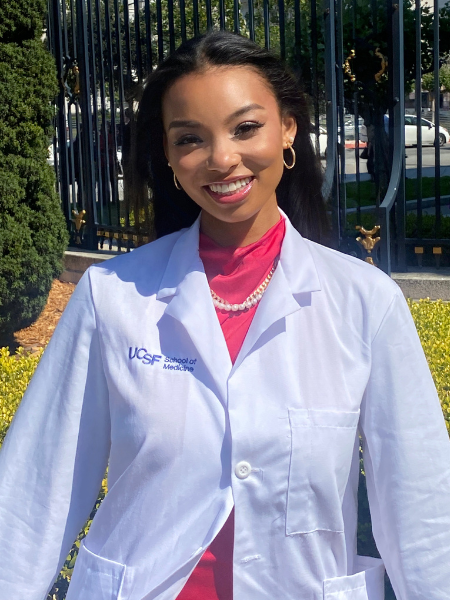
Having grown up as one of the few Black children in her small town in rural Arkansas – and inspired by the story of her mother, who was adopted from Seoul, South Korea – Boyd later worked at the Denver Health Doula Program, aiming to increase culturally competent care for marginalized patient populations.
“My personal, cross-cultural perspective fostered empathy and a deep understanding of the value of diversity,” said Boyd. “My work as a doula brought me an incredible sense of joy and fulfillment by providing essential support to pregnant people. We focused on addressing the racial disparities prevalent in maternal health care and aimed to ensure safe and empowering childbirth experiences.”
For Boyd, medical school also represents the opportunity to serve as a role model and mentor to members of her community. “I believe it is my responsibility to show little Black girls like me [and] orphans like my mother that their dreams can become a reality,” she said.
Indeed, it is the sharing of their unique stories, backgrounds, and experiences that prepares the Class of 2027 for clinical excellence. Theodore Michaels, a first-year student in the MSTP program said, “I believe that seeing people in their life contexts holds a unique capacity to demonstrate how the meanings of illness and social determinants of health play out in everyday life.”

Michaels’ interest in medicine began in high school, when he volunteered at a clinic for the uninsured in his hometown in rural Massachusetts. While there, Michaels was shocked to learn that some of the clinic’s clients were undocumented immigrants who had entered indentured servitude arrangements – and that many had been responsible for preparing the meals at a restaurant he frequented.
Many of these immigrants “had their ‘agreements’ extended indefinitely,” said Michaels, “and were overworked to the point of needing clinical care.” For Michaels, becoming a physician is a way to “provide care to marginalized people and to address the structural conditions that produce health disparities.”
By pursuing an MD/PhD in Medical Anthropology, Michaels aims to advance holistic, patient-centered care. “For me, anthropology stands out for its integral practice of participant-observation, or spending time and talking with people in their day-to-day lives,” he said.
These are the lessons that Julie Ann Sosa, MD, MA, FACS – Chair of the UCSF Department of Surgery – delivered in her Keynote Address to the Class of 2027. “Whether it be pandemics, fires, floods, labor strikes, or some other seemingly insurmountable obstacle, I encourage all of you to always remember your roots as humanistic future physicians…to keep an open mind through medical school and expose yourself to different people in different situations without prejudgments.”
And when it comes to community, Dr. Sosa stressed the importance of relying on each other. “Your professional success as medical students is predicated on a sense of belonging that hopefully you will experience as part of our wonderful community,” she said. “It's not just our patients who deserve our compassion. We also must never forget each other. Build relationships based on genuine curiosity and interest. And remember: you belong anywhere you want.”
Students were presented their white coats by Peter Chin-Hong, MD; John Davis, PhD, MD Karen Hauer, MD, PhD; Erick K. Hung, MD; Katherine Julian, MD; and Talmadge E. King Jr., MD.
Peter Ureste, MD, Professor of Psychiatry, led the students in the recitation of the UCSF Physician Declaration, a pledge to serve, care for the ill, and ameliorate pain and suffering.
“We count on you to champion our goal of making UCSF a university that is home to people with diverse identities and backgrounds, all of whom are committed to advancing equity, belonging, and anti-oppression in medicine,” said Dean King. “To be a place where people from all backgrounds feel they belong and can be successful. Welcome to the UCSF School of Medicine, and congratulations! You have joined an amazing community, and we know that you will help make USCF even better.”
